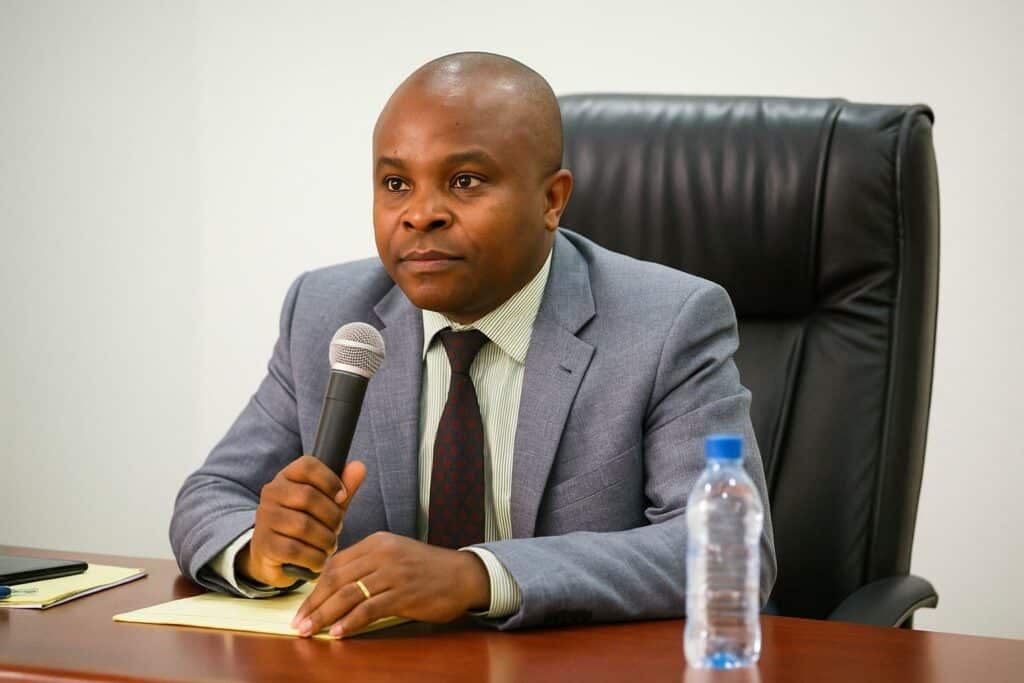Citizen-led constitutional vigilance in focus
An expectant silence filled the main auditorium of Université Henri-Lopes when Dr Sergelin Briguel Omboula, constitutionalist and lecturer at the École nationale d’administration et de magistrature, stepped to the lectern. His inaugural lesson, delivered before an audience dominated by first-year law and political-science students, revolved around a proposition both simple and ambitious: only an informed citizenry can guarantee the longevity of the Constitution of the Republic of Congo. In carefully weighted language, the scholar framed the text of 2015 not merely as a legal charter but as a social covenant that requires daily stewardship.
Dr Omboula’s address unfolded in three analytic movements that he described as the “foreseen”, the “limited” and the “revitalised” protections of the Basic Law. The tripartite structure allowed him to contrast the robust architecture planned by the framers with the practical obstacles that sometimes blunt that architecture, before sketching pathways toward a renewed civic pact.
Historical backdrop of constitutional discourse
Inviting his audience to take a longer view, the speaker recalled the wave of national conferences that swept across Central Africa in the early 1990s, giving Congolese pluralism its contemporary contours. In those forums—rich in ideological diversity yet unified by a demand for peaceful governance—the notion of citizen guardianship of the Constitution emerged as both protective shield and democratic compass. Subsequent scholarship, he noted, remains at an embryonic stage, an observation corroborated by comparative studies from regional think tanks (Centre d’études politiques d’Afrique centrale, 2023).
Against that background, Article 50 of the current Basic Law expressly enjoins every citizen to “conform” to the Constitution. Far from being a passive obligation, the provision places the individual at the heart of the institutional edifice, a position reinforced by jurisprudence of the Cour constitutionnelle emphasising popular sovereignty (Official Gazette of the Republic of Congo, 2017).
Academic insights from Dr Omboula’s tripartite model
The first layer, protection foreseen, rests on classical mechanisms. These include direct referrals to the constitutional bench, indirect controls exercised during pending litigation, and responsibly marshalled public mobilisations that remain within the boundaries of lawful expression. Each of these procedures, Dr Omboula underscored, has been validated by Congolese practice and comparative francophone experience.
Protection judged limited arises whenever constitutional texts are ignored, misunderstood or knowingly breached. Here the lecturer identified three converging factors: persistent misperceptions of the Basic Law, inadequate civic pedagogy and what he cautiously termed a deficit of “constitutional patriotism”. None of these factors, he stressed, reflects an immovable fatality. Rather, they reveal a work in progress that academia and civil society are well placed to advance in partnership with public authorities.
The revitalised protection he advocates would give fresh momentum to the citizen as counter-power by enlarging access to constitutional justice and by demystifying procedural thresholds. This agenda includes, for example, clarifying conditions for an exception of unconstitutionality so that litigants may raise the issue with greater confidence before ordinary courts.
Mechanisms of judicial engagement explained
At the heart of the lecture stood a practical demonstration of how any justiciable, in the course of ordinary proceedings, may invite a judge to test the conformity of a contested statute. This exception mechanism, incorporated into the 2004 organic framework and reaffirmed in 2019 amendments, offers what Dr Omboula called a quietly revolutionary avenue: empowering the individual litigant without bypassing the institutional chain of command.
He illustrated the point with a hypothetical press-freedom case in which a student journalist questions a provision deemed restrictive. By triggering constitutional review, the student would not only safeguard personal rights but also contribute to the collective refinement of the legal order. Such examples, the professor argued, confirm that civic vigilance and judicial prudence are interdependent rather than antagonistic.
À retenir
The Constitution’s endurance relies on informed citizens who are equipped to seize both judicial and civic tools, from referrals to measured public mobilisation. Popularisation of the Basic Law is therefore not an academic luxury but a stabilising imperative that serves governance, economic planning and social cohesion alike.
Le point juridique/éco
Expanded access to constitutional adjudication lowers transaction costs for economic actors by clarifying the normative environment. Investors prize predictability; when citizens help purge obsolete or ambiguous statutes, they indirectly reinforce the rule-of-law credentials that international lenders and ratings agencies monitor closely. In this sense, civic constitutionalism dovetails with the government’s ambition to improve Congo’s positioning in regional competitiveness indices.
Pathways toward a revitalised constitutional culture
Closing his address, Dr Omboula invited students to resist intellectual self-censorship and to embrace a culture of evidence-based debate. He argued that courage in pursuit of scientific truth is fully compatible with respect for public institutions, and indeed buttresses them. The proposed reforms—simplified standing rules, instructional campaigns in local languages and revitalised civic clubs—can, in his view, be pursued in harmonious concert with national authorities committed to durable stability.
The auditorium emptied slowly. Many lingered in small groups, animatedly discussing how they might translate the day’s lesson into moot-court initiatives or community outreach. If the measure of a lecture lies in its capacity to inspire applied learning, the constitutionalist’s call for vigilant citizenship appears already to have found fertile ground within Congo’s next generation of administrators, magistrates and policy advisers.

